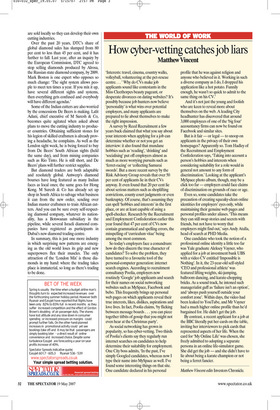How cyber-vetting catches job liars
Matthew Vincent
‘Interests: travel, cinema, country walks, volleyball, volunteering at the pet-rescue centre... ’ Why do CVs make job applicants sound like contestants in the Miss Cleethorpes beauty pageant, or desperate divorcees on dating websites? It’s possibly because job hunters now believe ‘personality’ is what wins over potential employers, and many applicants are prepared to lie about themselves to make the right impression.
A survey by Reed Recruitment a few years back claimed that what you say about your interests when applying for a job can determine whether or not you get an interview: it also found that mundane hobbies such as ‘reading’, ‘drinking’ and ‘socialising’ put off employers almost as much as more worrying pursuits such as ‘ferret-racing’ or ‘collecting Samurai swords’. But a more recent survey by the Risk Advisory Group reveals that over 50 per cent of applicants lie in their CVs anyway. It even found that 20 per cent lie about serious matters such as shoplifting convictions, county court judgments or even bankruptcy. Of course, that’s assuming they can spell ‘hobbies and interests’ in the first place, or are at least capable of using a spell-checker. Research by the Recruitment and Employment Confederation earlier this year found that 47 per cent of CVs now contain grammatical and spelling errors, the misspelling of ‘curriculum vitae’ being among the most common.
So today’s employers face a conundrum: how do they discern the true character of candidates? To solve the problem, they have turned to a favourite tool of the personal-computer generation: internet search engines. According to recruitment consultancy Poolia, employers now routinely ‘Google’ job applicants and search for their names on social networking websites such as MySpace, Facebook and bebo. This frequently brings up personal web pages on which applicants reveal their true interests, likes, dislikes, aspirations and love lives. In fact, Poolia claims, ‘by flicking between message boards ... you can piece together titbits of gossip that you might not even hear at the Christmas party’.
As social networking has grown in popularity, so has cyber-vetting. Two thirds of Poolia’s clients say they regularly run internet searches on candidates to help determine their suitability for employment. One City boss admits, ‘In the past, I’ve simply Googled candidates, whereas now I type their name into MySpace as well. I’ve found some interesting things on that site. One candidate declared in his personal profile that he was against religion and anyone who believed in it. Working in such a diverse company as I do, I dropped his application like a hot potato. Funnily enough, he wasn’t so quick to admit to the same thing on his CV.’ And it’s not just the young and foolish who are keen to reveal more about themselves on the web. A leading City headhunter has discovered that around 3,000 employees of one of the ‘big four’ accountancy firms can now be found on Facebook and similar sites.
But is it fair — or legal — to snoop on applicants in the privacy of their own homepages? Apparently so. Tom Hadley of the Recruitment and Employment Confederation says, ‘Taking into account a person’s hobbies and interests when considering suitability for a role would in general not amount to any form of discrimination.’ Looking at the applicant’s MySpace photo album, though, may be a click too far — employers could face claims of discrimination on grounds of race or age.
Even so, some candidates take the precaution of creating squeaky-clean online identities for employers’ eyes only, while maintaining their genuine web pages and personal profiles under aliases. ‘This means they can still swap stories and secrets with friends, but not have to worry that employers might find out,’ says Andy Atalla, head of search at PHD Media.
One candidate who took the notion of a professional online identity a little too far was Yale graduate Aleksey Vayner, who applied for a job at investment bank UBS with a video CV entitled ‘Impossible is Nothing’. In it, the 23-year-old self-styled ‘CEO and professional athlete’ was featured lifting weights, ski-jumping, ballroom dancing, and karate-chopping bricks. As a sound track, he intoned such managerialist guff as ‘failure isn’t an option’, and ‘always push yourself outside your comfort zone’. Within days, the video had been leaked to YouTube, and Mr Vayner had a much higher online profile than he’d bargained for. He didn’t get the job.
By contrast, a recent applicant for a job at the BBC literally put her cards on the table, inviting her interviewers to pick cards that represented aspects of her life. When the card for ‘My Online Life’ was chosen, she freely admitted to adopting a separate persona in an online life-simulator game. She did get the job — and she didn’t have to lie about being a karate champion or not being a ferret fancier.










































































 Previous page
Previous page